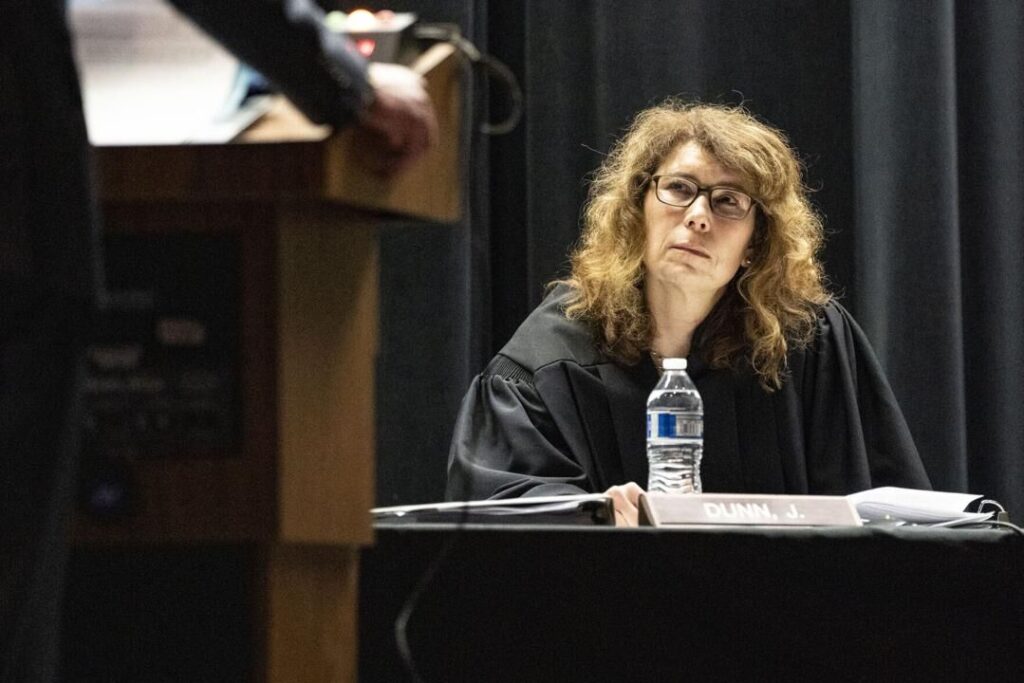10th Circuit mulls whether to block Colorado’s ‘ghost gun’ law
Members of the Denver-based federal appeals court last week probed the details of a 2023 Colorado law prohibiting the possession and purchase of certain firearm components not imprinted with a serial number — deemed “ghost guns” — that a trial judge declined to block last year.
To address the proliferation of guns privately assembled from kits or 3-D printers, the General Assembly enacted Senate Bill 279 two years ago, making it a misdemeanor to possess ghost guns unless the owner obtains a serial number from a licensed firearm dealer and the dealer performs a background check. Multiple violations of the law are felony offenses.
After a collection of gun rights groups and individual plaintiffs failed to receive a preliminary injunction, they turned to the U.S. Court of Appeals for the 10th Circuit.
“There was a tradition of making firearms at the time of the Founding,” argued attorney Barry K. Arrington to a three-judge appellate panel on Jan. 22. “The Founders knew about that activity. In fact, they encouraged it. They did not regulate it, much less prohibit it as the state of Colorado has done.”

The Byron White U.S. Courthouse in Denver, which is home to the U.S. Court of Appeals for the 10th Circuit.
“Here, the ‘why’ of this law is to keep firearms out of the hands of dangerous people,” countered Solicitor General Shannon Stevenson. “We’re talking about unprecedented societal change and dramatic technological changes that make the situation far, far different from anything we can compare it to at the Founding.”
The legal context of the case centers on the U.S. Supreme Court’s 2022 decision in New York State Rifle & Pistol Association, Inc. v. Bruen. By 6-3, the conservative-majority court laid down a new legal framework for analyzing the constitutionality of gun regulations broadly, scrapping the government’s ability to illustrate how a limitation on Second Amendment rights would advance a compelling public safety goal.
Instead, Bruen requires the government to show a restriction is “consistent with this Nation’s historical tradition of firearm regulation.”
The decision kicked off a wave of litigation against regulations ranging from local gun safety ordinances to the federal prohibition on felons owning firearms. Last year, the Supreme Court backpedaled slightly, clarifying its Bruen decision “permits more than just those regulations identical to ones that could be found in 1791.”
After Colorado lawmakers enacted SB 279, the National Association for Gun Rights and Rocky Mountain Gun Owners sued to strike down the law using Bruen. But in a May 2 order last year, U.S. District Court Judge Gordon P. Gallagher declined to issue a preliminary injunction, finding the plaintiffs did not have standing to challenge certain aspects of the law. Otherwise, he did not believe SB 279 even implicated the plaintiffs’ Second Amendment right to keep and bear arms.
The law “imposes a condition on the commercial sale of a firearm,” wrote Gallagher, a Joe Biden appointee. It “does not prevent an individual from buying an unfinished frame or receiver or firearms part kit and in no way infringes upon Plaintiffs’ right to acquire arms. Rather, the Statute requires the purchaser to have the frame or receiver serialized.”
On appeal, the parties faced a panel of three Republican-appointed judges. Both sides agreed that if the 10th Circuit believed the Second Amendment did apply, the case should return to Gallagher for a full constitutional analysis.
“What, in your view should the district court have done?” asked Judge Allison H. Eid, a first-term appointee of President Donald Trump.
Arrington responded that Gallagher should have declared the serialization requirement unconstitutional as applied to the plaintiffs, and the ban on 3-D printing and manufacturing unconstitutional in its entirety because it is a “flat-out prohibition” on an activity that existed since the Founding.
“But how specific do you have to be” in comparing modern regulations to the Founding, wondered Eid.

U.S. Magistrate Judge Gordon P. Gallagher appears before the U.S. Senate Committee on the Judiciary on Dec. 13, 2022 for his confirmation hearing.
Colorado received support at the 10th Circuit from a collection of Democratic-led states and from gun safety groups, which submitted briefs arguing there was an important policy reason to curb the proliferation of weapons that law enforcement cannot trace.
“Try as they might, Plaintiffs cannot rebrand ghost guns as the rightful heir to a long tradition of innocent gunsmithing,” wrote the Brady Center to Prevent Gun Violence, Everytown for Gun Safety Support Fund and Giffords Law Center to Prevent Gun Violence. “At no point in the history of this country have amateurs had the technology to assemble a deadly weapon in a matter of minutes, all while remaining invisible to law enforcement.”
Stevenson defended Gallagher’s finding that the serialization requirement for guns did not trigger the Second Amendment’s protection on keeping and bearing arms.
“Clearly, nothing about having a background check or a serial number implicates that right,” she said. The plaintiffs’ “annoyance with that is completely separate from what their rights or their interest in the Second Amendment are.”
“Your statute seems to take particular aim at 3-D printed guns. But it seems to sweep in a lot of other homemade guns, as well,” said Judge Joel M. Carson III, a Trump appointee. “Do you see a distinction with taking aim specifically at a 3-D printed gun — a very highly technical situation there — as opposed to basically every other kind of homemade gun?”
Stevenson responded that Colorado’s law was aimed at “sophisticated” 3-D printing and assembly from kits, but she acknowledged it could also encompass “somebody with sufficient machinist skills” who makes a gun from scratch.
The case is National Association for Gun Rights et al. v. Polis.











